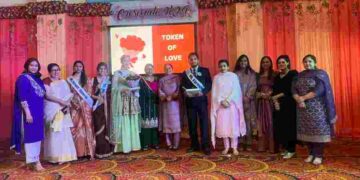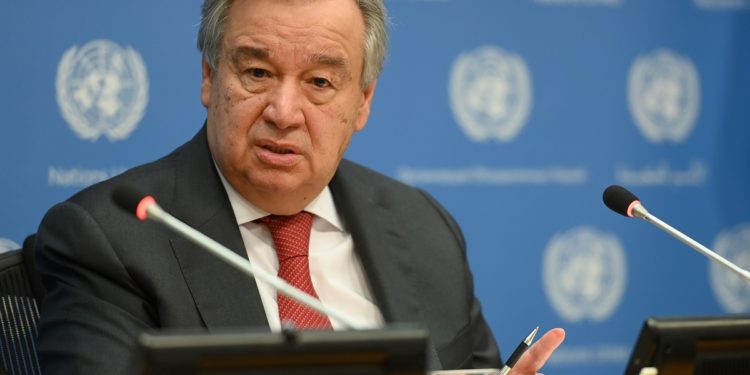The UN chief told a high-level meeting to commemorate the recent International Day for Total Elimination of Nuclear Weapons that progress on ridding the world of nuclear weapons ‘has stalled and is at risk of backsliding’
United Nations, October 3
UN Secretary-General Antonio Guterres warned that the world is living “in the shadow of nuclear catastrophe”, fuelled by growing distrust and tensions between the nuclear powers.
The UN chief told a high-level meeting to commemorate the recent International Day for Total Elimination of Nuclear Weapons that progress on ridding the world of nuclear weapons “has stalled and is at risk of backsliding.”
And he said strains between countries that possess nuclear weapons “have increased nuclear risks”. As examples, Guterres has expressed deep concern at the escalating disputes between the Trump administration and China. Relations between the US and Russia are at a low point.
Nuclear-armed India and Pakistan are feuding over Kashmir, and India just had a border skirmish with China. And North Korea boasts about its nuclear weapons.
Without naming any countries, Guterres said programs to modernise nuclear arsenals “threaten a qualitative nuclear arms race”, not to increase the number of weapons but to make them “faster, stealthier and more accurate”.
Guterres also pointed to the only treaty constraining the size of the world’s largest nuclear arsenals – the New Strategic Arms Reduction Treaty between the United States and Russia – which is set to expire next year.
“It is imperative” that the two countries extend it without delay for the maximum five years, he said, warning that without a treaty there is an “alarming possibility of a return to unconstrained strategic competition”. The secretary-general said the nuclear non-proliferation treaty or NPT, which marks its 50th anniversary this year, remains the cornerstone of nuclear disarmament and efforts to prevent the spread of nuclear weapons.
The five-year review of its implementation was postponed because of the COVID-19 pandemic until next year and Guterres urged its 191 parties to use the extra time to strengthen the treaty, including making “tangible progress towards the elimination of nuclear weapons”.
Guterres said he also looks forward to the entry into force of the first-ever treaty to ban nuclear weapons, which was adopted in July 2017 by 122 countries. Once it has 50 ratifications, the treaty will enter force in 90 days, and with Malaysia’s ratification on September 30 it now has 46.
At Friday’s high-level meeting, 103 of the 193 UN member nations were scheduled to speak for two minutes each. But many spoke longer so only 79 delivered addresses, and the UN said it would post the rest.
Of the major nuclear powers, Russia and China were on the speakers list but didn’t get to speak. The United States, Britain and France skipped the meeting. So did North Korea and Israel, which is widely reported to have a nuclear arsenal but has never admitted it publicly.
India and Pakistan were scheduled to speak, but only India got to deliver remarks.
Many speakers recalled that the meeting took place 75 years after the United States dropped nuclear bombs on Hiroshima and Nagasaki, which killed 210,000 people and sped the end of World War II.
Iran’s Foreign Minister Mohammad Javad Zarif, whose country is still part of a 2015 agreement with Russia, China, Britain, France and Germany aimed at preventing the Islamic Republic from obtaining nuclear weapon, said the meeting “provides a unique opportunity to mobilise the world to liberate humanity from the nuclear nightmare.”
India’s Foreign Secretary Harsh Vardhan Shringla reiterated the country’s longstanding commitment to nuclear disarmament through a step-by-step process, and said all states possessing nuclear weapons need to hold a “meaningful dialogue” to build trust and confidence.(Agencies)








